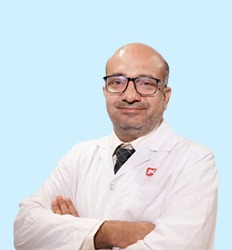Prostate cancer occurs in the prostate, a small walnut-shaped gland found behind the bladder and in front of the rectum in males. This small gland secretes a fluid that mixes with semen to maintain sperm health throughout conception and pregnancy. Prostate cancer is a severe disease. Fortunately, most people with prostate cancer are detected before the disease progresses beyond the gland.
At ILS hospitals, treatment options are tailored to each patient’s needs, including surgery, radiation therapy, chemotherapy, and hormone therapy. Our multidisciplinary team of experts utilises advanced diagnostic tools like biopsy and MRI to accurately assess and stage cancer. We focus on providing the most effective treatments while maintaining quality of life. Our team supports patients through every step of their prostate cancer journey.
Symptoms
Early-stage prostate cancer rarely produces symptoms. These concerns may arise as the condition progresses:
- Frequent, sometimes urgent, need to pee, particularly at night.
- Weak urine flow or intermittent flow.
- Dysuria is defined as pain or burning while peeing.
- Loss of bladder control.
- Loss of bowel control.
- Painful ejaculation and erectile dysfunction (ED).
- Blood in semen or pee.
- Pain in your lower back, hips, or chest.
Causes
Causes of prostate cancer are as follows:
- Age: The risk increases with age, particularly after the age of 50.
- Family History: A family history of prostate cancer can elevate the risk.
- Genetic Mutations: Inherited gene mutations (e.g., BRCA1, BRCA2) can increase susceptibility.
- Ethnicity: African-American men have a higher risk of developing prostate cancer.
- Hormones: High levels of testosterone may contribute to prostate cancer development.
- Diet: A high-fat diet, especially one rich in animal fats, may increase risk.
- Obesity: Being overweight or obese may raise the likelihood of aggressive prostate cancer.
Diagnosis
We perform screening tests to reveal whether you have signs of prostate cancer that necessitate additional testing, such as a digital rectal exam and blood test.
- Imaging: An MRI is conducted to produce images of your prostate gland, including any questionable spots that could be cancer. This data helps the doctor to determine whether to perform a biopsy.
- Biopsy: Our doctors perform a needle biopsy, which involves removing a tissue sample for cancer testing in a lab. It is the only definite approach to identifying prostate cancer and determining its aggressiveness.
Treatment
We determine your therapy based on a variety of circumstances, including your overall health, the extent of spread of cancer, and how quickly it is progressing. Depending on the therapy, we collaborate with other healthcare experts, including urologists, radiation oncologists, and medical oncologists. The majority of prostate cancers discovered early on can be cured with treatment. A few of them are as follows:
- Surgery: Our doctors remove the damaged prostate gland. It helps to successfully eradicate prostate tumors that have not spread.
- Radiation therapy: We make use of this procedure either as a solitary treatment for prostate cancer or in conjunction with other therapies. Radiation can also help relieve symptoms.
- Systemic therapies: If the cancer has gone beyond the prostate gland, our doctor may consider systemic treatment, which delivers substances throughout the body to kill or prevent cancer cells from growing.
- Focal therapy: Our Team uses this procedure as a novel type of treatment that kills tumors within the prostate. This treatment is advisable for low-risk cancer that has not spread.
Prevention
It is not possible to prevent prostate cancer. Nonetheless, taking these precautions may help lower your risk:
- Receive periodic prostate screenings.
- Maintain a healthy weight.
- Exercise regularly.
- Maintain a healthy diet.
- Quit smoking.















































